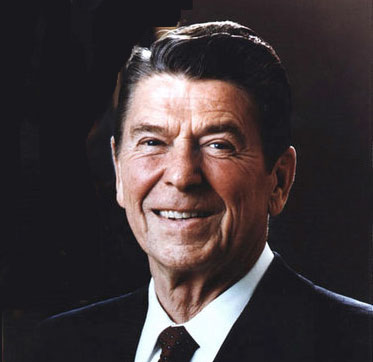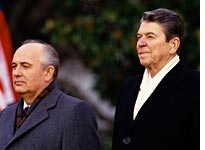
Item #1: Who is Reaganer?
All of the Republican candidates seemed to have given up talking about "issues" or even themselves, and instead have focused on who is more like their hero Ronald Reagan. The way they were talking about him in last Thursday's debate in South Carolina, you'd think Reagan was the second coming of Christ. Everything that Reagan did was brilliant and he is the ideal president that they all aspire to be. I find this to be very disappointing.
I hold the following opinions regarding our nation:
1. Government should strive to treat all of its citizens equally.
2. Government should ensure the prosperity of all of its people.
3. The president should be somewhat knowledgeable and aware of important events.
4. Only people who are not wickedly corrupt should be appointed to serve in high public office
5. The Government should make long-term plans that go beyond the current election cycle in order to safeguard the prosperity of future generations
6. The President should not be viewed and treated as incompetent by his closest advisers.
7. Government and the President should be honest with its people.
8. The Executive Branch should not try to ignore and directly disobey the Constitution (for example, by doing things expressly forbidden by Congress, like training para-military groups in Central America to overthrow democratically elected governments or selling missiles to our nation's #1 enemy)
While many people may not ascribe to these principles, ostensibly this would include all the major candidates for President in the Republican Party, if you do believe in these principles, as I do, you would have to grade Reagan to be one of the WORST, if not THE WORST, President in American history (the current administration exempted). As long as Americans continue to think that Reagan was anything more than a horrible president, future candidates will continue to use Reagan as a historical precedent for their insane policy proscriptions and in fact use Reagan to legitimize those policies.
While I'm at it, let me tackle two more myths related to Reagan:
-Myth #1 Reagan won the Cold War
hehe...I never get tired of this one. In 1991, after leaving the presidency two years before, Reagan finally won the Cold War by charging up a mountain killing Russia's champion warrior, Mikhail Gorbachev, and conquering the last bastion of communist resistance in the Kremlin.
The way people talk about Reagan and the Cold War, you'd think this actually happened. The reality is quite different. Most idiots who claim that Reagan won the Cold War do so based on three theories:
 1. Reagan was tough with the communists and they finally caved in because they couldn't take the heat.
1. Reagan was tough with the communists and they finally caved in because they couldn't take the heat.2. The election of a fervent anti-communist like Reagan showed that the U.S. was not willing to back down. This lead to the Russians losing morale and giving up.
3. Reagan's massive military buildup could not be met by the Russians, so they folded up rather than compete.
Let's go through these shall we:
First, Reagan did not do anything different with Russia than his predecessors. End of story. It could be said that Reagan used tougher rhetoric, but in reality Reagan was never any harsher with actual Russian officials than say Truman, Eisenhower, Kennedy, Johnson, Nixon, or Carter. All of his predecessors were very tough with communists. More than anything, Reagan used his rhetoric to get elected not to really push around communists, whom he negotiated with regularly.
Second, according to most analysts, the election of Reagan was not seen as very important by most high-ranking communists. The only group that it seems to have affected were those in the military who called for MORE confrontation with the U.S. and demanded MORE influence within the Politburo. Taking into account that the military nearly put an end to Yeltsin's attempt to break apart the Soviet Union, it could be argued that Reagan's bellicose personality nearly entrenched communism for another generation.
Third, it is true that the Soviets backed down from Reagan's ridiculous military buildup. How this lead to the fall of communism is not exactly clear. It still could be said that the buildup did lead to the end of the Cold War, but two things should be kept in mind: one, this was an unforeseen consequence (Reagan had no clue that the Russians were even capable of backing down) and two, the reason the Soviets couldn't compete with the U.S. in military expenditures was that its economy and political support was collapsing. It is somewhat ironic that conservatives that credit Reagan for ending the Cold War neglect to mention that what really ended the Cold War was the inefficiencies and contradictions within communism and a command economy.
Myth #2: Reagan= Tax Cuts, Tax Cuts, Tax Cuts, and more Tax Cuts

There have been many surreal moments during this election cycle. I have two favorites. One was an exchange in a debate between Fred Thompson and Mike Huckabee that went like this (paraphrased):
Thompson: I fear that Gov. Huckabee may not be willing to follow the Reagan model. He raised taxes in his state and he has endorsed liberal economic policies.
Huckabee: In Arkansas we cut taxes 63 times. And trust me, there were plenty of people who were not happy about it, but I still cut taxes because I believed that our government was too big.
In other words, 63 tax cuts was not enough.
The other also involved Huckabee, but this time with Romney:
Romney: Now answer me frankly, did you or did you not raise taxes in your state?
Huckabee: I built roads and bridges and schools-
Romney: That's political talk. Are you going to answer the question?
...
Huckabee: When I first took office we did need funds for some improvements, but once those were finished I worked to cut the fat out of the state's government. I cut taxes 63 times in my ten years as governor.
This is the state of the debates between Republicans. Who can cut taxes faster, quicker, more often and craziest deserves to be president. 'What 9.2 trillion dollar debt?'
I won't bother to mention how stupid this is and that supply-side economic theory was discredited 15 years ago and that every reasonable economist thought the Bush tax cuts to be insane and that the Bush tax cuts have been a huge failure, but I will mention Reagan. Reagan raised taxes. Twice. As Governor of California, not only did Reagan raise taxes but he did little to prevent the continued growth of state government. As President, Reagan repealed his own tax cuts once it became obvious that...well.. they were insane, making the country bankrupt, and destroying the economy.
Item #2: Civil Rights Faux Paus
Recently, Hillary Clinton made the following statement: "Dr King’s dream began to be realised when President Lyndon Johns
 on passed the Civil Rights Act of 1964. It took a president to get it done."
on passed the Civil Rights Act of 1964. It took a president to get it done."There are three things to be said about this:
One, I don't mind politically incorrect statements...unless they are from a politician ...from a party that I'll be voting for.
Two, related to the first, why the hell did she say this? Why is this even relevant. Is she writing a book on the history of the civil rights movement? She's running for president, why do I need to know her particular interpr
 etation of historical events. What was her point? The closest I've come to answering this question is that she's comparing MLK to Obama and pointing out that change only occurs when an experienced leader (like Johnson) is able to work with the system and get things done. All I have to say to that is...Hillary Clinton is no Lyndon Johnson.
etation of historical events. What was her point? The closest I've come to answering this question is that she's comparing MLK to Obama and pointing out that change only occurs when an experienced leader (like Johnson) is able to work with the system and get things done. All I have to say to that is...Hillary Clinton is no Lyndon Johnson.Three, she's just wrong. Her interpretation is simplistic and not entirely accurate. The Civil Rights movement was a gr
 assroots movement who's major leaders included Martin Luther King. There would have been no Civil Rights Act without pressure from prominent figures like King and there would not have been a Martin Luther King if not for the individuals who risked their lives and livelihood to stand up for justice on a daily basis for decades. LBJ just didn't wave a magic wand and get civil rights legislation passed. The turning point came when Congress was willing to go ahead with it. This happened first with the grotesque violence that occurred on the March to Selma, which spawned the passage of the Civil Rights Act, and the killing of Civil Rights workers in Mississippi, which spawned the Voting Rights Act. In fact, LBJ was UNABLE to get civil rights legislation passed. If anyone should be credited, it should be the racist Southerners whose violence outraged the nation enough to forego their own racist inclinations and allow their representatives to pass some meaningful legislation. I will give LBJ credit for one thing he did all on his own: affirmative action. I should point out that the executive order that established affirmative action took no wrangling or expertise...it just
assroots movement who's major leaders included Martin Luther King. There would have been no Civil Rights Act without pressure from prominent figures like King and there would not have been a Martin Luther King if not for the individuals who risked their lives and livelihood to stand up for justice on a daily basis for decades. LBJ just didn't wave a magic wand and get civil rights legislation passed. The turning point came when Congress was willing to go ahead with it. This happened first with the grotesque violence that occurred on the March to Selma, which spawned the passage of the Civil Rights Act, and the killing of Civil Rights workers in Mississippi, which spawned the Voting Rights Act. In fact, LBJ was UNABLE to get civil rights legislation passed. If anyone should be credited, it should be the racist Southerners whose violence outraged the nation enough to forego their own racist inclinations and allow their representatives to pass some meaningful legislation. I will give LBJ credit for one thing he did all on his own: affirmative action. I should point out that the executive order that established affirmative action took no wrangling or expertise...it just took will to do it.
took will to do it.Item #3: Romney's last stand
Today is the Republican Primary in Michigan. If Romney doesn't win, I will consider his candidacy over. If Romney can't win in Iowa where he spent more campaign money than anyone in that state's history and he can't win in a state that neighbors one that he was governor of and has overlapping local news and he can't win in Michigan where his father was a three time governor, where can he win?


No comments:
Post a Comment